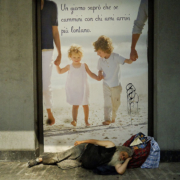Acknowledgements
The most important acknowledgements in this era of the middle are those intended, “upstream and downstream”, for those people who have helped us exist and find a dreamibility of experience.
Thanks to Stefania Marinelli and Claudio Neri for the continuity of their activities and the development of “works” for a perspective on the care of mental disorders, accompanying the complexity of our growth, with the knowledge of how fortunate we are to be alive, not just biologically, but in living thoughts as they evolve. The gratitude I feel towards them is also linked to my affection for having looked after my “child thoughts”, long ago, with respect and acceptance; it is precisely the acceptance of thoughts, without the fear that they may not be perfect or complete, that allows us to think them again, to “assemble and disassemble” them, exercising doubt in temporarily losing certainties in order to recompose others.
Thanks to the colleagues who have written for this issue, for their ability to stay together in experimenting themselves with patients for their good and not for the good of theories, that is, without becoming fanatics in the claustrum of individual schools.
I thank them for not having used authors as a shield, but as internal companions, colleagues who we have chosen, and “keys” to problematize the “human” we encounter in our work.
Thanks for not losing sight of the operating cultural contexts that, following Nathan and Devereux, are intimately connected to the ways in which one becomes ill and is treated in a society.
Thanks to those colleagues who keep away from one of the most dangerous modern illnesses, that is, the ill use of power.
I thank Simona Faucitano and my children Tommaso, Fiammetta and Samuele, my brother Fabio and his wife Valeria Mosconi, and my parents.
Thanks to ABA, and especially to Fabiola de Clercq who has been able to listen to me and appreciate many of us in an open dialogue for the growth of an institution that has been vital for over twenty years.
Thanks also to colleagues of the “Transgenerationale” and other close colleagues, Paolo Leoni, Maura Monguzzi, Francesca Borgogno, Fiammetta Gubetti, Sara Bruni, Maurizio Pinato, Enrico Varrani, Luigi Valera, Davide Catullo, Armando Ciriello, Adriano Formoso, Roberto Viganoni, Gaetano Della Cerra, Leopolda Pelizzaro, Dora Rossi, Roberto Cerabolini, Marco Ramella, Claudio Cassardo, Francesco Bisagni, Chiara Mauri, Danila Benedetto, Fabrizia Tomasi, Sara Vignali, Michele Bardin, Andrea Bocchiola, Marco Riva, Roberta Resega, Federico Bianchi, Pierchristian Verde, Andrea Narracci, Pasquale Pismataro, Goriano Rugi, Stefania Colombo, and I apologise to those I have forgotten.
Thank you to the collaborators of Etnopsicopatologia Dr. Sara Bruni and Dr. Luigi Cabua.
Thank you to Domenico Ferrara and Paolo Colavero for having read and edited the texts; thank you to the former students of IIPG who are now brilliant colleagues and who have been able to develop ideas and group practices in very challenging psychiatric contexts, not only because of the complexity of the patients, but also for being able to “be” in institutions, thinking them as organisms and implicit groups.
Thank you to Valerio Galeffi, with whom we share the commitment to ABA in Rome.
Thanks you to the teachers and supervisors of IIPG in Milan and the rest of Italy. Thanks you to the group ARGO.
Thanks you to Mario Perini.
Thanks you to the teachers of all time, Claudio Neri, Marco Sarno, Antonello Correale, Mario Rossi Monti, Stefania Marinelli, Diego Napolitani, Franco Borgogno and Eugenio Gaburri.



